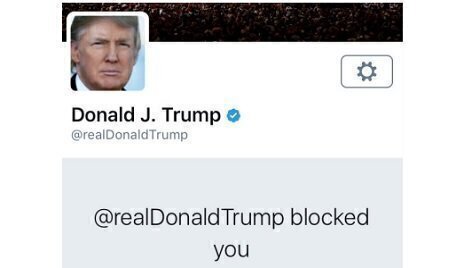In legal papers filed late last week, Justice Department lawyers want a federal court to dismiss a First Amendment lawsuit about President Donald Trump’s Twitter account.
 Back in July, the Knight First Amendment Institute at Columbia University filed a lawsuit on behalf of seven plaintiffs in the United States District Court For The Southern District Of New York. The group of Twitter users said their constitutional rights were violated after they were blocked by Trump or his surrogates from following the President’s social media account.
Back in July, the Knight First Amendment Institute at Columbia University filed a lawsuit on behalf of seven plaintiffs in the United States District Court For The Southern District Of New York. The group of Twitter users said their constitutional rights were violated after they were blocked by Trump or his surrogates from following the President’s social media account.
The litigants want the Trump Twitter team to immediately restore their access to Trump’s account, so they can comment on Trump’s Twitter messages. “Plaintiffs respectfully ask that the Court declare that the viewpoint-based exclusion of the individual Plaintiffs violates the First Amendment, and order the Defendants to restore their access,” the suit read.
On October 13, the Justice Department made its case about a lawsuit that it claims is meritless because it is based on Trump’s routine use of Twitter as a private matter.
“According to the plaintiffs, the management of his personal Twitter account has become state action, and his use of standard Twitter features is now constrained by the limitations of the First Amendment that apply to government action in a public forum,” said the legal team, led by Acting Assistant Attorney General Chad Readler.
Readler made several constitutional arguments that refuted the claims made by the former Trump Twitter followers. “It would flout the separation of powers for the Court to issue an order limiting the President’s discretion in managing his Twitter account,” said Readler.
Other factors cited by the Trump team were that his Twitter messages aren’t state actions; the personal Twitter account is not a public forum; and that a viewpoint-neutral requirement doesn’t apply to President Trump’s personal speech. The legal team also said the offended Twitter users don’t have standing to sue Trump and three other defendants.
And the legal team made an important argument about the ability of the plaintiffs to see the President’s tweets without being on Twitter. “The Individual Plaintiffs have the same ability to see tweets from the @realDonaldTrump account as the average member of the general public” by just using an Internet browser that isn’t signed into Twitter, they claimed.
The Institute’s legal team contended in July that recent Supreme Court comments along with President Trump statements not only supported the legitimacy of Twitter but also its status as an official communications platform of the President as an elected official.
The attorneys cited Packingham v. North Carolina, a recently decided Supreme Court decision where Justice Anthony Kennedy said that digital platforms “can provide perhaps the most powerful mechanisms available to a private citizen to make his or her voice heard. They allow a person with an Internet connection to ‘become a town crier with a voice that resonates farther than it could from any soapbox.’”
The Institute also argued that the “Plaintiffs are Twitter users who have been blocked by one or more of the Defendants from the @realDonaldTrump account because they criticized the President or his policies.” They then alleged several First Amendment violations: the Twitter blocking imposed viewpoint-based restriction on their participation in a public forum, it restricted their access to official presidential statements, and restricted their ability to petition the government for redress of grievances.
According to court records, both sides will continue to file briefs until November 22.







